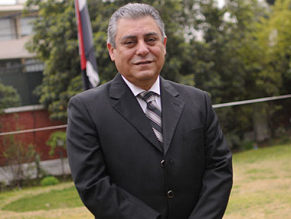|
World Jewish News

40 years ago, Egyptian President Sadat made an historic visit to Israel. Egypt's ambassador to Israel Hazem Khairat implored Israelis to push Israeli leaders to make peace with the Palestinians and warned that the ongoing absence of peace would lead
|
Israel-Egypt peace treaty strong despite lack of civilian ties
21.11.2017, Israel and the World In a rare interview to the Israeli media, Egyptian Ambassador to Israel Hazem Khairat told Army Radio that military ties between Cairo and Jerusalem remain strong but he asked Israelis to re-read Sadat’s speech to the Knesset, as well as the 2002 Arab Peace Initiative and implored them to push Israeli leaders to make peace with the Palestinians and warned that the ongoing absence of peace would lead to regional chaos.
“I ask the Israeli people to push their leaders to make peace,” Khairat said. “War will not bring peace or security. Peace is the only option. “
Speaking to Tazpit Press Service (TPS) at the Knesset on the sidelines of a conference to mark the 40th anniversary of Egyptian President Anwar Sadat’s historic visit to Jerusalem, Zvi Mazel, a former Israeli ambassador to Cairo confirmed that Israel’s military ties with Egypt remain strong.
But he added that the Arab world continues to lean on the Palestinian issue in order to divert attention from the core issues blocking civil ties between Israel and the Arab world.
“I think that all Arab countries understand very well that there are problems with the Palestinians – namely, that they don’t want to reach a possible agreement. The main issue here is Muslim Arab ideology and education, and that is being ignored by the media, by governments,” said Mazel, who served as ambassador in Egypt from 1996-2001.
“As long as the Arabs continue to educate the young generation to hate Israel, there is never going to be peace between peoples,” he said.
He added that the lack of civilian ties between Israelis and Egyptians remains a sore point for Israel and rejected comments by Egyptian ambassador Khairat that “only a final-status agreement based on the two-state solution” would allow Cairo to open up civilian ties with Israelis.
Despite the lack of people-to-people ties, however, the ambassadors agreed that despite the peace agreement between the two countries is stable for a simple reason: It serves the interests of both sides. Mazel rejected the view, held by some Israeli leaders, that strict compliance with the military protocol of the Israel-Egypt peace treaty is “all that matters, and he accepted the suggestion that in hindsight Prime Minister Begin would have been wise to freeze the peace process the moment that Egypt violated the deal’s so-called Civilian Protocol . and approached that section of the treaty with the same importance as the military arrangements.
But that does not contradict the fact that military disengagement between the sides has been the treaty’s lasting benefit to both sides.
“Of course the military protocol remains the heart of the agreement,” Mazel said. “To Begin, and later we all understood it, the agreement took Egypt out of the region’s military equation and made it impossible to build an Arab military coalition to threaten Israel in a conventional sense. Forty years later, that remains true,” he said.
EJP
|
|
